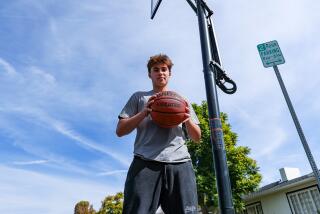Loyola’s Jay Hillock: From Young Head Basketball Coach to No. 2 Man
- Share via
Jay Hillock and Paul Westhead were preparing for basketball practice recently when an idle thought struck Hillock while he was stowing equipment.
“You think it’s been a long way down for you, coming from the Forum,” Hillock teased Westhead, who used to coach the Lakers. “I’ve gone from head coach to equipment manager.”
Hillock tells the story with an impish grin, but there certainly have been some unexpected curves in the path followed by the 39-year-old assistant basketball coach at Loyola.
Hillock has gone from coach at Santa Barbara City College in his hometown to being one of the youngest Division I head coaches in the West at Gonzaga University, his alma mater, to being an assistant in the same conference.
Gonzaga, in Spokane, Wash., qualifies as a lonely outpost among major colleges. After a year as an assistant and four seasons as head coach there, Hillock felt that he had taken the program about as far as he could, and resigned in 1985. He wanted to return to Southern California.
Close friends thought he had enough of coaching, and that he would fall back on several business ventures including real estate. He didn’t think he needed coaching anymore.
Three weeks later, Loyola hired former Clippers Coach Jim Lynam as their head man, and he invited Hillock to be his assistant. Hillock, who was friendly with Lynam, immediately accepted. The next month, Lynam left for another National Basketball Assn. job and Westhead was hired. Hillock, whose Gonzaga team had beaten Loyola seven out of 10 times, was suddenly an assistant there to a man he didn’t know who ran a system that was foreign to most of Hillock’s coaching philosophy.
“One reason I jumped at the job was I thought I might one day be a candidate for the (head coaching) job,” Hillock said at his desk earlier this week. He shares an office with Loyola’s other full-time assistants, Judas Prada and Bruce Woods.
“I didn’t think (Lynam) would be here that long. I didn’t think he would only be here six weeks.”
Hillock, whose ideal game may have been when his Gonzaga team upset DePaul 49-48, was suddenly working for a guy who wanted to score 100 points a game.
“Because everybody (in the WCAC) but Paul plays a medium pace, close to the vest, Paul’s kind of the six-shooter in this league,” Hillock said. “It was hard to get used to at first. The toughest thing was the amount of turnovers. One of my goals (at Gonzaga) was to always be conscious to turnovers. Paul doesn’t want to hinder the fast break.”
Philosophically, they may have been at odds, but the pairing worked. The Lions finished 19-11 that season and made their first appearance in the National Invitation Tournament.
Hillock’s major contributions are in scouting opponents and preparing game tactics. His reputation is for solid teaching skills, organization and pervasive knowledge of opponents in the conference.
One of his contributions this year was the idea of switching from a zone press to man-to-man coverage to make more deliberate opponents pick up the pace. “Paul asked me a way to speed up the league, because I know the league,” Hillock said. “I suggested we man press instead of zone press after baskets. Paul has tinkered with it and refined it.”
It worked. In Loyola’s first conference game last week against the University of San Diego, the Lions made 14 steals, most of them clean, in the first half alone. They scored 98 points against St. Mary’s, which had held 38 straight opponents to 70 points or less.
“To me that’s the best thing we’ve done in years. . . . Now they just can’t hold the ball,” Hillock said.
Westhead kept Hillock and Prada on his staff, though he knew neither man. He likened it to a blind date. “I was leery, but not because I thought any negative things,” Westhead said. “Both have been terrific from Day 1.
“Jay does a little bit of everything--he sets up our strategy, gives me input on changing tactics going into the game, or even during games. The interesting thing about our background is Jay was always a ball-control coach. But now he’s showing me things about how to run better. If you’ve got a good basketball mind, even if it’s a new system, you can apply it.
“We started from scratch. He was an extremely knowledgeable basketball person who I relied on. What I learned later was he’s extremely reliable.”
Hillock said the new coaching system will benefit him down the road. “I’ll probably learn more from Paul (than Lynam). I’ve learned a lot more offensive technique and pressure technique from Paul because we’re at opposite ends of the spectrum.”
Hillock is somewhat small of stature, but he has a strong drive and an intensity that is more evident in practice, where he can run drills and scream at players. At Loyola he has learned to rein his emotions on the bench and let Westhead be the visible one.
He smiles easily, but there’s no mistaking his intensity for the game.
Although Hillock’s Northwest Passage has run its course, he still has deep ties to the area. His girlfriend went to Gonzaga, and Dan Fitzgerald, who preceded and succeeded Hillock at Gonzaga, remains his best friend in coaching. Fitzgerald’s top assistant now is Joe Hillock, Jay’s younger brother. Jay Hillock is often on the phone to Spokane several times a day.
At 31, he was named head coach at Gonzaga. His brother, three years younger, came on as an assistant. Hillock rarely had NBA-level talent at Gonzaga--which gets the majority of its players from the Northwest--but he managed a 60-50 record including a season-best 17-11 mark. When he was an assistant, he and Fitzgerald fashioned a 19-win season, the school’s best in 14 years.
His last season there, the team started out 13-5, then lost its two top players to injuries and completed the season 15-13, a 2-8 finish. The frustration ate at Hillock.
Coaching at Gonzaga “was very tough,” Hillock said. “I have a lot of positive feelings toward Gonzaga. I just caught myself in a situation where I was so down I didn’t know if I wanted to coach again.”
In his first two seasons at Loyola, Hillock’s influence was still being felt at Gonzaga, where most of the players were recruited by him. There were mixed feelings when the two teams met, but Hillock’s natural competitiveness came through. “I didn’t like losing to ‘em,” he said. “I’m tied to those people. I want them to do as well as they can, but not at our expense.”
Joe Hillock said he gets excited when he coaches against his brother. “You prepare a little harder in that situation because you know how competitive he is. I want my mom and dad to call me after” the game.
Both Joe Hillock and Fitzgerald were surprised that Jay got back into coaching only weeks after leaving Gonzaga.
“At least here, I think he enjoyed it more as an assistant. (Resigning) was entirely his choice. I tried to talk him out of it,” said Fitzgerald, who now doubles as coach and athletic director. “It’s pretty tough to win here. It’s a hard job physically. I’ve had a lot of opportunities to leave. I love it here so I’ve got reason to stay. There’s no pressure here--he would have had a job as long as I was here--but if you’re good at what you do, you put pressure there. I’m really comfortable at Gonzaga. Jay, I think, had had enough.
“This might not have been a great job to be a perfectionist in.”
Fitzgerald and Hillock stay in constant touch, but Fitzgerald said their league rivalry makes some topics taboo. “When you socialize you can’t talk about each other’s teams. You’re a little more guarded,” he said. “Jay is a tremendously loyal individual. He’ll work as hard for Loyola as he did here.”
Hillock has formally applied for one coaching job since he got to Loyola. There’s no equivocation when asked if he’d like to be a head coach again. “I would like to be a head coach as soon as possible,” he said. “But I don’t want to take just any job. I had a tough job and did reasonably well.”
Hillock has followed the WCAC since his boyhood, when UC Santa Barbara was a member. He’s not committed to staying in the conference, but he would miss it. “I think this league is well-coached,” he said. “It’s not an over-talented league but extremely well-coached from top to bottom. We have a fun league to coach in.”
He hopes to be able to point to a revived Loyola program as a springboard. “I think we’ve started something . . . that will carry itself,” he said. “We’ve got to have a good recruiting year and keep it going. I see good things (in future seasons)--top half of the conference, hopefully post-season play.”
Westhead said he “would be surprised” if a coaching job didn’t come Hillock’s way. “He’s very competent,” Westhead said. “He knows the college game from A to Z. If they want a good person--like they all say they do--he should be at the top of any college’s list.”
Fitzgerald concurred: “I do hope he stays in it. We need guys like Jay in coaching. He’s a great guy. The Hillocks did a lot of good things raising their kids, but more than anything else they taught them to work.”
But Hillock throws in a qualifier: “I’d really like to have an opportunity to be a head coach again, though . . . I don’t see myself as an old coach. I don’t see myself coaching into the middle 50s or anything like that.
“It all works out. If I get my shot, I get my shot. If not, maybe I shouldn’t have moved.”
“Jay’s a hard guy to figure out,” Fitzgerald said. “I say, whatever he does, as long as he’s happy, it’s OK.”
More to Read
Get our high school sports newsletter
Prep Rally is devoted to the SoCal high school sports experience, bringing you scores, stories and a behind-the-scenes look at what makes prep sports so popular.
You may occasionally receive promotional content from the Los Angeles Times.






